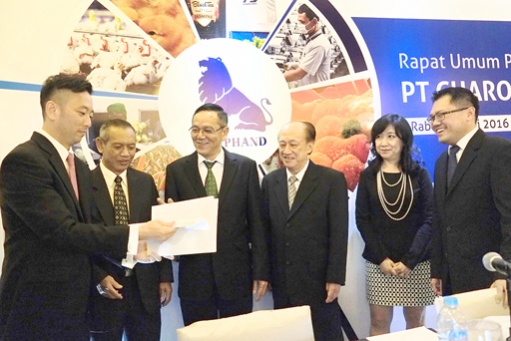Poultry company Charoen Pokphand Indonesia director Eddy Dharmawan Mansjoer (from left to right), independent commissioner Suparman Sastrodimedjo, president director Tjiu Thomas Effendy, independent commissioner Herman Sugianto, director Ong Mei Sian and director Ferdiansyah Gunawan Tjoe chat after a press conference after the company’s shareholders meeting in Jakarta on Wednesday. Charoen Pokphand Indonesia has given out Rp 29 dividend per share or a total of Rp 475.5 billion, up 16.9 percent from last year. (JP/Jerry Adiguna)
Animal feed producer and poultry firm PT Charoen Pokphand Indonesia plans to strengthen its presence in second-tier cities to tap new growth potential.
Charoen president director Tjiu Thomas Effendy said on Wednesday that the company would focus on markets outside of large cities to boost consumption.
“Consumption of chicken in regional areas may still be relatively low compared to larger cities, but the economy is now more spread out rather than centered on cities. So we feel that the potential is there. People outside of large cities need protein, too,” Thomas said.
Thomas was only named the publicly listed firm’s president director during the shareholders’ annual general meeting on the same day. He served as deputy president commissioner prior to Wednesday’s announcement.
In addition to focusing on smaller markets, Charon will continue to diversify its business portfolio by strengthening its beverage sector. Charoen now manages the Fiesta brand, which primarily deals with processed chicken meat, but has recently entered the beverage market with a range of bottled teas.
Most of the company’s beverages are produced at the company’s central factory in Pandaan, East Java. Despite wanting to strengthen the beverage segment, Charoen has no immediate plans to construct a separate factory for the purpose.
“Once the beverage segment is significant enough to our revenue, we may set up a plant. Maybe in the next three years, but I think even in three years, the contribution will still be minimal. After all, our entire food product segment still only contributed 9 percent in the last 10 years,” he elaborated.
Charoen’s revenue still primarily relies on the sale of poultry feed and day-old chicks (DOC). In the first quarter of 2016, poultry feed contributed 59 percent to the company’s revenue and poultry farming contributed 29 percent.
There are also no plans to build other factories, as the company wants to focus on improving the efficiency of existing operations.
It hopes that overall sales will rise by 15 percent year-on-year (yoy) to Rp 34.62 trillion (US$2.58 billion) in 2016. Net profits are seen to increase by 17 to 18 percent yoy to around Rp 2.16 trillion, thanks in part to an expected strengthening of the rupiah.
Charoen is looking to use 60 percent of its Rp 1.1 trillion capital expenditure in 2016 for maintenance, such as upgrading processing plants. The rest will be disbursed for the development of its recently established beverage segment.
As of June, the firm has invested roughly Rp 400 billion of the earmarked capex.
(Source: http://www.thejakartapost.com)



